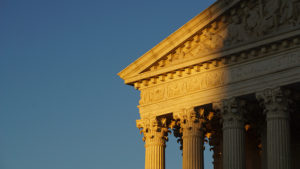All Eyes on Dobbs: The Supreme Court Takes Aim at Abortion Rights
 Photo by Ian Hutchinson on Unsplash
Photo by Ian Hutchinson on Unsplash Before the United States Supreme Court decision in Roe v. Wade, which granted people the legal right to an abortion, people underwent dangerous procedures and took costly measures to terminate pregnancies. If you needed an abortion before Roe, you might have traveled to another country, spent most of your savings, or even risked death or serious injury through at-home procedures with no medical supervision. The rights affirmed in Roe allow individuals with uteruses to make their own choices about their bodies, but with recent developments, those same rights could be at stake.
That’s due in part to a Mississippi law that the United States Supreme Court recently announced it will review. The case, Dobbs v. Jackson Women’s Health Organization, deals with a 2018 law that prohibits abortions after fifteen weeks of pregnancy, except in medical emergencies or cases of severe fetal abnormality. At fifteen weeks, the fetus is not yet viable, meaning it’s incapable of surviving outside the uterus. When the law was brought before the lower courts, even Judge James Ho, a staunch opponent of abortion, reluctantly acknowledged that the courts were bound by precedent set in Roe―that it “establishes viability as the governing constitutional standard”―and shot down the law.
The Supreme Court is incredibly selective in the cases it hears. The most important criterion for Supreme Court review is a circuit split, in which the Court accepts cases to resolve conflicts among the lower courts. However, in Dobbs, the courts of appeals were undivided in ruling that the abortion ban is in direct violation of fifty years of Supreme Court precedent. Furthermore, the Court decided to focus its argument in Dobbs specifically on “whether all pre-viability prohibitions on elective abortions are unconstitutional.” With this question, the Court has the power to issue a decision that goes beyond Mississippi’s fifteen-week ban, signaling that the majority may view this case as a vehicle to directly challenge Roe v. Wade.
Overturning legal precedents is uncommon, but not unheard of. Stare decisis is a legal doctrine that binds courts to follow historical cases on rulings to ensure uniformity and fairness in the law. The Supreme Court has consistently upheld the decision in Roe v. Wade as stare decisis, even when controlled by a conservative majority. However, on a handful of occasions the Supreme Court has reversed precedent rulings on the grounds that they were in error. With the current conservative majority and numerous Trump appointees on the Court, experts are increasingly concerned that this is an opportunity for the justices to overturn the precedent set in Roe.
Dobbs will be the first abortion case to be fully argued before the Court since Justice Amy Coney Barrett’s confirmation. With her addition to the court last October, the Supreme Court now has a conservative supermajority of six to three. Her conservatism, strong religious background, and condemnation of abortion were of concern to many at the time she assumed the bench, and it seems that we’re about to understand the full consequences of her confirmation.
While overturning Roe is a possibility, it isn’t necessarily the most likely outcome. We may instead see a narrow ruling that upholds Dobbs without completely overturning Roe. Still, weakening Roe would have major implications across the nation, with more than twenty states likely to take steps toward banning abortion outright. It could open the floodgates for more extreme laws and ultimately threaten our rights to make personal and critical health decisions. Now, more than ever, we need to come together to urge Congress to pass comprehensive protections to help defend against impending and current abortion bans and restrictions. The constitutional right to abortion has never been more under threat than it is today.
